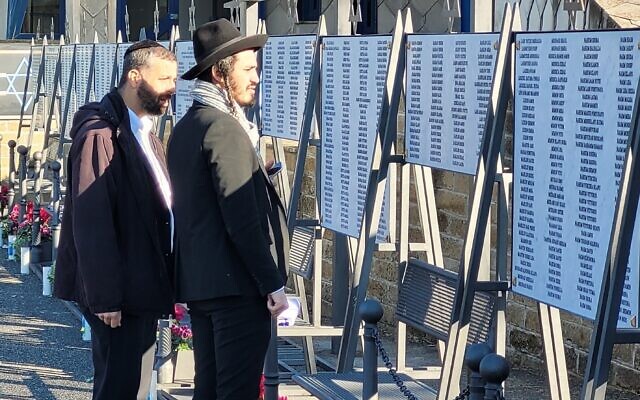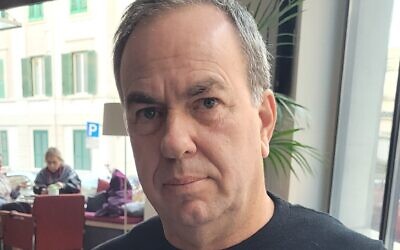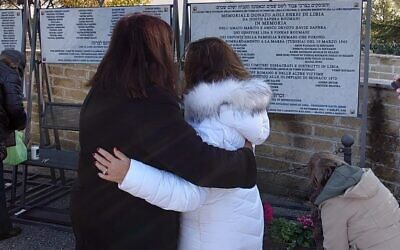‘It brings closure, when your loved ones have no grave’
Marbled plaques listing Libyan Jews unveiled in Rome five decades after Qaddafi bulldozed the country's Jewish cemeteries

Not all Jewish cemeteries in Libya have been bulldozed. There is one on a hill near the former Giado concentration camp in the mountainous west, close to the desert, where almost 2,600 Libyan Jews were deported in 1942 and where 562 died. There is one in Khoms, a port city on the Mediterranean coast. The rest are gone. Nothing but fading memories.
Jews who grew up in Libya talk of overlaying old city maps onto new ones to work out where the cemeteries once stood. You simply couldn’t tell from looking. Whatever remains of them for now lies under streets and high-rise blocks. For family members, there has been nowhere to go to remember their loved ones. Until now.
Last week, at the Jewish section of the giant Prima Porta Cemetery in Rome, Jews born in Libya unveiled 16 new marble blocks containing the engraved names of Jews who died in – and were buried in – Libya.
Paid for by a London-based philanthropist, the marbles were unveiled in front of Holocaust survivors, local Jewish leaders, diplomats, and dignitaries. A Libyan deputy prime minister had been due to attend and apologise for the events that caused thousands to leave the country, but ill health hospitalised him before the trip.
The 16 new marbles are engraved with the names of around 1,800 Libyan Jews whose graves were razed on the orders of Colonel Muammar al-Qaddafi, who overthrew King Idris in 1969 and who was himself overthrown and killed in 2011. For families, there is now a place to come and to remember.
“It brings closure,” said Penina Meghnagi Solomon, 73, who lives in Santa Monica. “When your loved ones have no grave, it helps enormously if there’s a place with their name, where you can come and find peace.”

Her father, a Jewish national swimming champion of Libya, died in 1963 of kidney failure and was buried in a Jewish cemetery in Tripoli. Four years later, aged 17, she was one of 5,000 Libyan Jews forced to flee to Italy on Alitalia night rescue flights in June 1967 after anti-Jewish rioting broke out in Libya over Israel and the Six Day War. She stayed in Italy for four years, partly in a refugee camp, before moving to Israel, where she met her American husband. They later moved to Los Angeles.
“I write poetry about it,” she says. “It helps me process it. I don’t remember anything about having to leave – the flight, the arrival, nothing. Luckily, I wrote it down in a diary at the time, so I have a record. I think the brain erases trauma to protect you.”
All but about 100 Jews had left Libya by the time Qaddafi took power in 1969, which is just as well, because his government – in thrall to the pan-Arabist Egyptian leader Abdel Nasser – confiscated Jewish property, cancelled Jewish debt, and prohibited Jews from emigrating. Still, most managed to get out. By 2003, the last Jew – Rina Debach, aunt of memorial organiser David Gerbi – had left.

How different it all was in the first part of the 20th century. In 1903, there were 14,000 Jews in Tripoli and 2,000 in Benghazi. In 1911, Libya was colonised by Italy. By 1931, there were 21,000 Jews in Libya, roughly four percent of the total population. In 1941, it had grown again, with 25 percent of Tripoli’s residents now Jewish, around 40,000 Jews across the country, and at least 44 synagogues.
That was to reverse spectacularly. Italy became fascist under Benito Mussolini, a wartime ally of Hitler’s. Jews soon had to pull their children from school, stop marrying ‘Aryans’, relinquish state employment, quit the skilled professions, and have their passports stamped with the words ‘Jewish race’. In 1942, after Libyan Jews welcomed Allied soldiers in Benghazi, German general Erwin Rommel ordered that many be deported to Giado, including Shimon Doron’s parents.

“The programme was to destroy the Jewish presence in Libya,” says Doron, an Israeli businessman who attended the memorial event in Rome last week. “Where to start? Benghazi and Cyrenaica. Why? Because there weren’t too many [Jews] there and they didn’t cooperate with the government.
“My father Yosef and mother Bruria had been recently married. My father kept looking on the synagogue wall to see if their names were posted. After two weeks, their names appeared. They were herded into trucks and transported west. It took three days. The Italian Carabinieri policed it.

“There was no stopping. All their bodily needs had to happen in the truck. In the evening they slept under the stars. He kept a diary and called it ‘hell on earth’. At the camp they were put in a shed. It was designed for 100 but there were 300. They were given just two blankets per family.”
“My sister, Ada, was three months old. One day, my mother and Ada got typhus. Ada was taken to see a doctor, who gave her an injection. A few hours later, she died. My father took her body to the hill by Giado to bury her.” Gerbi went back to Libya several years ago and thinks he saw Ada’s grave. “It was very small, for a baby.”

Although the British liberated the camp in January 1943, many were too ill or weak to return home for several months. When they did, two pogroms followed: in November 1945, when 133 Jews were killed; and in June 1948, when 13 Jews were killed.
For most Libyan Jews, enough was enough. Between 1949-51, more than 30,000 left Libya for the new State of Israel. However, several thousand chose to stay. For a while, under the stewardship of King Idris, times were good. “These Jews were mainly members of the upper middle classes,” said Eyal David, deputy chief of the Israeli mission in Morocco, writing in a thesis several years ago. “They did not have their bags packed, as one might think.”
He said that while some Libyan Jews had integrated, most identified more closely as European, not Arab. Some also held Italian, French, or British passports. They spoke in Italian, not Arabic, and spent time in private members’ clubs, the men even enjoying stripteases from European and North African women. Meanwhile, articles in newspapers and sermons in mosques were increasingly hostile to Jews.
Riots finally broke out on 5 June 1967, following news of the Six Day War involving Israel, with 17 Jews killed, including several members of the Luzon and Raccah families. King Idris relocated the roughly 4,000 remaining Jews to a military base for their protection and issued them with papers allowing them to emigrate. The last exodus was now in motion.

The Jewish community in Rome swung into action. Guest houses in the city were leased and three refugee camps (Capua, Latina, and Canzanella near Naples) were set up. The first flights arrived at Rome’s Fiumicino Airport on 20 June 1967. A group of young Tripolitanians was formed to shuttle Libyan Jews from the airport. Kosher meals were arranged, and religious services organised, as flight continued through July and August.
There was an immense sadness that the Jewish community, “which was for generations an integral part of the social fabric of the country, had had to hide then quickly leave Libya, their homes, and all their possessions,” writes David.
Among those on the flights was philanthropist Judy Saphra, a major Magen David Adom donor who funded the 16 marbles unveiled at the Prima Porta Cemetery last week. “This memorial to my father is to a man I never knew – I was born after his death at the hands of Libyan Arabs merely because he was Jewish,” she said.
“I never saw his tomb because my grieving mother wanted to spare me the pain of such great loss. Only years later, while attending the funeral of her own father, did she take me by the hand to see my father’s tomb. That’s why I wanted to commemorate and sponsor this memorial: in the name of my father, and for the Jewish community of Libya in Rome.”

Thank you for helping to make Jewish News the leading source of news and opinion for the UK Jewish community. Today we're asking for your invaluable help to continue putting our community first in everything we do.
For as little as £5 a month you can help sustain the vital work we do in celebrating and standing up for Jewish life in Britain.
Jewish News holds our community together and keeps us connected. Like a synagogue, it’s where people turn to feel part of something bigger. It also proudly shows the rest of Britain the vibrancy and rich culture of modern Jewish life.
You can make a quick and easy one-off or monthly contribution of £5, £10, £20 or any other sum you’re comfortable with.
100% of your donation will help us continue celebrating our community, in all its dynamic diversity...
Engaging
Being a community platform means so much more than producing a newspaper and website. One of our proudest roles is media partnering with our invaluable charities to amplify the outstanding work they do to help us all.
Celebrating
There’s no shortage of oys in the world but Jewish News takes every opportunity to celebrate the joys too, through projects like Night of Heroes, 40 Under 40 and other compelling countdowns that make the community kvell with pride.
Pioneering
In the first collaboration between media outlets from different faiths, Jewish News worked with British Muslim TV and Church Times to produce a list of young activists leading the way on interfaith understanding.
Campaigning
Royal Mail issued a stamp honouring Holocaust hero Sir Nicholas Winton after a Jewish News campaign attracted more than 100,000 backers. Jewish Newsalso produces special editions of the paper highlighting pressing issues including mental health and Holocaust remembrance.
Easy access
In an age when news is readily accessible, Jewish News provides high-quality content free online and offline, removing any financial barriers to connecting people.
Voice of our community to wider society
The Jewish News team regularly appears on TV, radio and on the pages of the national press to comment on stories about the Jewish community. Easy access to the paper on the streets of London also means Jewish News provides an invaluable window into the community for the country at large.
We hope you agree all this is worth preserving.





















